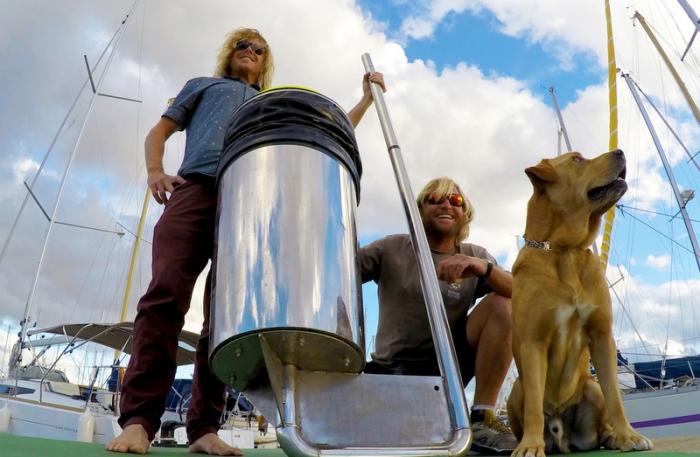On Deck: At last, good news for our oceans

PHUKET: Ocean trash is growing. It’s an important issue that gets a lot of attention, at times, but little is actually done about it. Two Spain-based Aussie surfers, Pete Ceglinski and Andrew Turton, are about to change that.
In a former life, Turton was a product designer who realized that the plastic products he was designing were sources of pollution. As surfers, he and Ceglinski were very aware of the waste problem and teamed up to fix it. They quit their jobs and moved to live in Spain, where they have taken it upon themselves to bring their Seabin prototype into reality.
“We are two normal guys who quit their day jobs to try to turn their dream into reality, and with everyone’s support it’s really happening,” Ceglinski explained.
Ceglinski and Turton have designed an automated rubbish bin that catches floating rubbish, oil, fuel and detergents. At this stage, it’s designed for marinas, private pontoons, inland waterways, residential lakes, harbors, water ways, ports and yacht clubs, but the potential is huge.
Marinas, ports and yacht clubs, however, are an ideal place to start, because having no huge swells or storms, they provide a relatively controlled environment and ultimately Mother Nature will bring the rubbish in and the Seabin will catch it.
So how does the Seabin work?
The Seabin is connected to a water pump on the dock/shore and sucks water from the surface into the bin, bringing with it debris and liquids. The catch bag inside is made of natural fiber and collects all the debris. The marine worker then simply empties the bag and disposes of the rubbish. Working 24/7, the Seabin is set to be an effective tool for reducing ocean trash.
Through crowd sourcing, in early January, Ceglinski and Turton reached their target and are now taking their current working prototype into production.
“Our aim is to be both as sustainable and responsible as we can be, in making the Seabins. They will not be mass produced in China, then shipped all over the world just to obtain a cheaper price,” said Ceglinski, explaining that they will be built in the most sustainable and responsible manner possible.
While Ceglinski and Turton both accept that, they also explain that the marinas that will install and operate the Seabins, and the local businesses that will help produce Seabins, are also amenable to the higher price.
“We aim to have Seabins produced on a variety of continents to help boost local economies and reduce shipping costs, which in turn reduces the price and reduces the carbon footprint of the Seabins,” Ceglinski added.
While some have questioned the possible impact on marine life, Ceglinski and Turton are talking with scientists to incorporate fish deterrent technology into the Seabins and are also working with a marine biologist to study the effect on microscopic sea life.
“Although it is possible that sea life could get trapped in the bins, in the four years of testing we haven’t caught anything. Sea life simply stays away from the surface and the current the Seabins produce, in the same way that fish stay away from the water pump in a home aquarium. If a fish or marine animal makes its way into the Seabin then it will be caught by the natural fiber catch bag, then simply thrown back into the water when the bag is changed by the marina worker,” added Ceglinski.
With their dream to improve the world’s oceans, these two surfers are about to leave a lasting legacy for the marine world that so many of us take for granted.
For more information, visit www.seabinproject.com.
Duncan Worthington is a long time Phuket resident and through Infinity Communications (www.infinity-comms.com) consults to leading consumer brands, hospitality and marine clients in Thailand. In his ‘spare time’ he runs the marine portal www.MarineScene.asia. #OnDeckPhuket
— Duncan Worthington
Latest Thailand News
Follow The Thaiger on Google News:


























